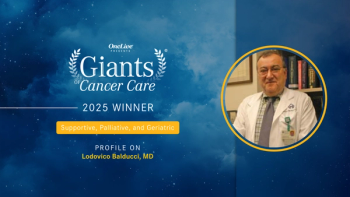
Thoughts on Metastatic Kidney Cancer
Transcript:Robert A. Figlin, MD: This has been an extremely informative discussion. Before we end this discussion, I’d like to get some final thoughts from each of our panelists. Let’s start with Toni.
Toni K. Choueiri, MD: It’s an exciting field. I’m very excited to be in the field of kidney cancer. I can tell you, we thought the field was going to stagnate since we only had a VEGF inhibitor, a VEGF receptor inhibitor, and a mTOR inhibitor. And suddenly in a year, we have 3 drugs. So, this is exciting. I think the sequence remains to be defined, but in a year or less, it may not be a relevant question because all these drugs are moving to the frontline setting. More than ever, a third point I want to make, we need a biomarker. Are we going to get it? I think we have more ammunition in terms of getting it because unlike the first-generation studies, now every trial that is ongoing or just finished accrual is really getting enough blood, enough tissue—some of these tissues are fresh—and sometimes blood to look at circulating-free DNA. So, we have more material to work in to define a biomarker, so I am quite encouraged by that.
Robert A. Figlin, MD: Michael?
Michael R. Harrison, MD: I think those are great points by Toni. Basically, we are moving toward precision medicine to develop biomarkers to find the right drug for the right patient at the right time. And one thing I want to just make sure is included in that is what I’m calling “precision survivorship,” so thinking not only about the benefit for the patient in terms of their disease, but thinking about their quality of life. I think it’s very important to continue to generate evidence along the lines of that on those patients in whom active surveillance is important, in whom intermittent dosing may be used, and certainly generating evidence about how we may do dose reductions, whether or not it’s using PKs again to keep the patient’s quality of life in the discussion as far as the precision medicine initiative.
Robert A. Figlin, MD: Eric?
Eric Jonasch, MD: These really are exciting times, Bob, but I think that the practice of medicine, in terms of how we actually take care of patients, hasn’t changed. And I think it’s even more important, in 2017, to be able to talk and listen to our patients, to be able to creatively manage toxicity and creatively interpret how progression is or isn’t happening in conjunction with the patient. We really do need to, I think, define success in new ways using new tools to be able to understand whether or not patients are benefitting.
Robert A. Figlin, MD: David?
David I. Quinn, MBBS, PhD: I can’t really add anything, but it has been a 2-decade journey for me. I used to talk to patients about whether we could get them beyond 6 months on subcutaneous interferon, and I think we’ve made immense progress. I think it has been a privilege to be on that journey. What’s great now is that the journey is not finished. We have a lot of challenges, both therapeutically and also with the science, and we need to keep addressing those.
Robert A. Figlin, MD: I think what I’d like to say to both the patients that hear our conversations, as well as our colleagues in the communities that practice and treat kidney cancer patients, is that I hope what you’ve heard today is the complexities of the balanced discussion, the recognition that, in some places, there aren’t the answers that we would like. Although we continue to strive to get them, and the recognition that if you’re a patient or a doctor, it is never a bad thing to get another opinion from someone who spends their life, like my colleagues, thinking about kidney cancer and how to address, answer, and ask the right questions for the individual patient. I think now, more than ever, we’ve done a great job in approving over a dozen agents, and there is more to come. But I think to Michael’s point, the right agent at the right time for the right patient for the right outcome is what we’re all striving for. Thank you all for your contributions to this discussion. On behalf of the panel, we thank you for joining us, and we hope you found this Peer Exchange® discussion to be both useful and informative. Thank you.
Transcript Edited for Clarity





































